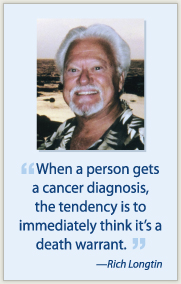I’ve been in alcohol and drug recovery for 20 years, and my wife of nearly 50 years, Arlene, and I have been through a lot together during that time. So 2 years ago, when my doctor told us that I had stage III prostate cancer and a Gleason score of 8, we both looked at him and asked if we could still go on our planned vacation to Hawaii. That’s been our attitude through this whole ordeal—not that there haven’t been some scary moments along the way.
Taking Control
 My years as a recovering addict taught me the power of taking control of my life. After my diagnosis, I searched the Internet for a month, looking for information about my cancer and its standard treatment. I didn’t want to feel afraid of my diagnosis and thought educating myself about the disease was the best way to tamp down that fear and figure out how to fight this enemy. I quickly discovered, however, that there are many unscrupulous people out there who are looking to sell you a cancer “cure” if you have the money to pay for it. The thought was enticing at first, but I quickly turned to the standard of care for my cancer. Still, I had to go through several oncologists before I found the one I was most comfortable with.
My years as a recovering addict taught me the power of taking control of my life. After my diagnosis, I searched the Internet for a month, looking for information about my cancer and its standard treatment. I didn’t want to feel afraid of my diagnosis and thought educating myself about the disease was the best way to tamp down that fear and figure out how to fight this enemy. I quickly discovered, however, that there are many unscrupulous people out there who are looking to sell you a cancer “cure” if you have the money to pay for it. The thought was enticing at first, but I quickly turned to the standard of care for my cancer. Still, I had to go through several oncologists before I found the one I was most comfortable with.
I was given injections of leuprolide to shrink the tumor and immediately developed menopausal-like symptoms, including severe hot flashes, which were so uncomfortable I had to take a 3-month medical leave from my sales position at a beach resort near my home in Santa Cruz, California. The hormone therapy was followed by 5 weeks of daily radiation therapy, which left me weak and fatigued. But by then, my oncologist said to me, “Rich, you’re not going to die,” and that was all I needed to hear. That’s when I really started to relax.
Rejecting Defeat
I think that when a person gets a cancer diagnosis, the tendency is to immediately think it’s a death warrant. I didn’t necessarily think that because of my background in recovery—I’ve seen that miracles happen every day. But a lot of guys don’t have that experience, and they become very negative. You have to keep a positive attitude. That’s why it’s so important for doctors to explain the prognosis right away and what the patient can expect as he goes through treatment.
A cancer patient needs to have complete control of his thought processes and cannot accept defeat. Prior to getting cancer I was in excellent shape, so after my diagnosis, to get through the treatment, I went on a lot of walks to keep up my physical stamina and practiced meditation to build up my mental stamina. While I was getting radiation therapy, I would visualize the cancer cells with little T-shirts (with a big C on the front) and would imagine the radiation beam systematically killing those cells. I also used meditation to build up my immune system, to fight the cancer and overcome the treatment side effects.
After my first dose of hormone therapy, Arlene and I took that Hawaiian vacation. Now, 2 years later, I’m cancer-free and back to work, and we’re planning our next vacation. ■
Rich Longtin, 70, is a sales associate at the Seascape Beach Resort on Monterey Bay in Aptos, California.

